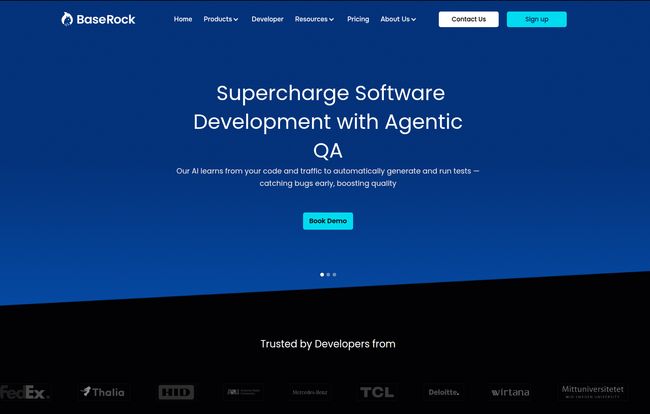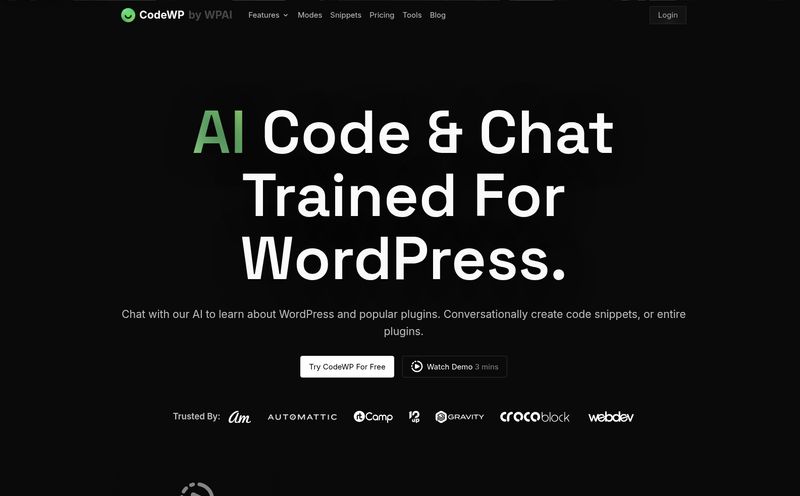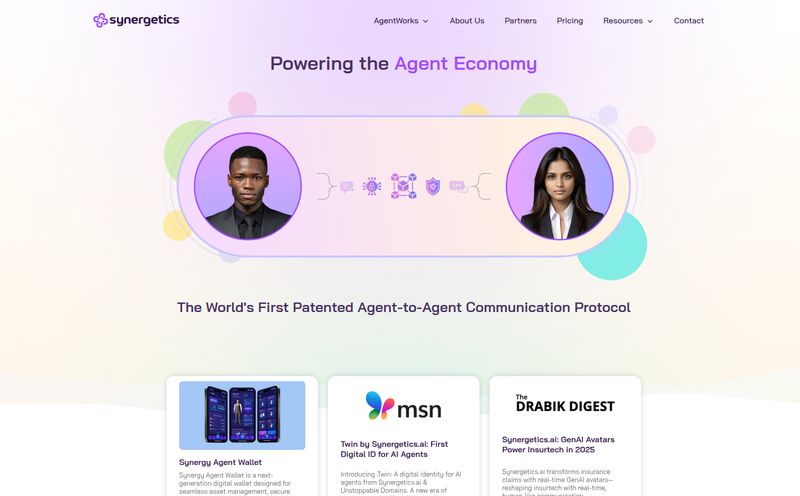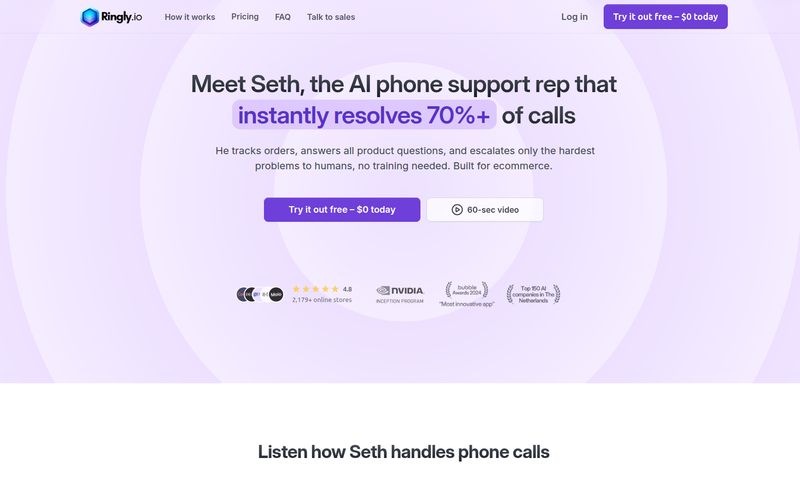If you’re a developer, you’ve probably had moments where writing tests feels like eating your vegetables. You know it’s good for you, you know it’ll prevent problems later, but man... sometimes you just want to get to the dessert—the actual feature you’re building. For years, we've treated testing as a necessary chore, a bottleneck that slows down the fun part of coding.
Then AI swaggered onto the scene, promising to change everything. We’ve seen it write boilerplate, suggest code, and even debug. So, the next logical step was always going to be testing, right? I've been watching this space for a while, and a name that keeps popping up is BaseRock.ai. They’re not just talking about AI-assisted testing; they're talking about “Agentic QA.” It sounds cool, but what does it actually mean for a developer on a Tuesday afternoon staring down a looming deadline? I decided to find out.
What on Earth is BaseRock.ai Anyway?
Putting aside the marketing jargon for a moment, BaseRock.ai is a software quality platform that uses AI to take the grunt work out of testing. Think of it less as a simple tool and more as an automated teammate. Its main job is to automatically generate, run, and maintain both unit and integration tests. The whole pitch is that it lets developers get back to building features, shipping code with the confidence that an AI agent has already checked their work for cracks and flaws.
Their term, “Agentic QA,” refers to this idea of an intelligent agent learning from your specific codebase—its style, its logic, its dependencies—to create tests that are actually relevant. This isn't just a generic test script generator; it’s designed to be a bespoke solution for your project. A pretty bold claim, if you ask me.
My First Impressions and the Core Features
Getting started wasn't a one-click magic show, and that's probably a good thing. There's some initial configuration, as you’d expect from any tool that needs to deeply integrate with your code. But once you're in, the architecture starts to make sense. It’s built on a framework they call LACE: Learn, Analyze, Create, Execute. It’s a continuous loop where the AI is always trying to get smarter about your code.
The Magic of Agentic QA
This is the heart of BaseRock. The platform’s AI agent reads your code to understand its function and context. It’s like having a junior developer who does nothing but read your pull requests and write corresponding tests 24/7, without ever complaining or asking for a coffee break. It handles the tedious setup, mocks dependencies, and generates assertions. It’s the part that feels the most like the future we were promised.
Automated Unit and Integration Testing
BaseRock doesn't just do one or the other. It tackles both unit tests (checking the small, individual pieces of your code) and integration tests (making sure all those pieces play nicely together). Automating this entire spectrum is a huge time-saver. I’ve seen teams burn entire sprints just trying to increase test coverage. A tool that automates this process could genuinely change a team's velocity.
Fitting Into Your Workflow with CI/CD Integration
Any new tool that disrupts an existing workflow is usually dead on arrival. The folks at BaseRock clearly get this. It’s built to plug directly into your existing CI/CD pipeline (think Jenkins, GitLab CI, GitHub Actions). This means the AI-generated tests can run automatically every time you push new code, catching bugs long before they ever see the light of a production server. It becomes a safety net that's woven directly into your development process.

Visit BaseRock.ai
The Real-World Gains. Do the Numbers Add Up?
Okay, the BaseRock homepage throws around some big numbers: 80% test coverage, 95% developer productivity, and a 40% reduction in QA costs. As a seasoned (and slightly cynical) pro, I always take these with a grain of salt. Are you going to hit 95% productivity on day one? Probably not.
But here’s my take: even if you achieve half of that, the return is massive. Imagine cutting the time you spend on writing mundane tests by 40% or 50%. What could you do with that extra time? You could refactor that messy module you’ve been avoiding, experiment with a new library, or just… think. The real gain isn't just a number on a dashboard; it’s the reclaimed cognitive space for creative and complex problem-solving. It's about shifting developer energy from maintenance to innovation.
A Breakdown of BaseRock.ai's Pricing
Alright, let's talk money. No tool is great if you can’t afford it. BaseRock has a tiered structure that seems to cater to pretty much everyone, from students to massive corporations. Here's how it breaks down:
| Plan | Price | Who It's For | Key Features |
|---|---|---|---|
| Community | Free | Solo developers, students, or anyone wanting to test the waters. | 10 classes/month, limited test runs, community support. |
| Pro | $14.99 /month | Freelancers and individual professionals. | 50 classes/month, unlimited runs, testability feedback. |
| Growth | $39 /user/month (Billed Annually) | Growing teams and established businesses. | Batch test generation, CI/CD integration, team collaboration. (Min. 10 users) |
| Enterprise | Contact Sales | Large organizations with specific security and scale needs. | Self-hosted options, offline mode, dedicated support, PR plugins. (Min. 50 users) |
The free Community plan is genuinely useful for a trial run. The Pro plan feels like the sweet spot for an individual developer. The Growth and Enterprise tiers are clearly aimed at teams where the cost is an investment in quality and speed across the board. I appreciate that they offer both cloud and self-hosted options for enterprises—that’s a critical feature for orgs with strict data privacy rules.
The Good, The Bad, and The AI-ish
What I Really Liked
The biggest win for me is the sheer speed. The idea of generating a suite of tests for a new feature in minutes instead of hours is just... fantastic. And the support for a wide range of languages (Java, Python, JavaScript, Go, and more) and IDEs means it’s not some niche tool for a specific stack. It’s built for the way most of us actually work. The early bug detection is also a godsend. It’s like having a psychic for your codebase, pointing out potential issues before they become late-night emergencies.
A Few Things to Keep in Mind
It's not all sunshine and automated tests. The reliance on AI means you still need to be the human in the loop. You can't just blindly trust every test it generates. Think of the AI as a very smart, very fast co-pilot; you’re still the pilot who has the final say. You'll need to review, and sometimes tweak, the output. Also, for larger teams, the enterprise features come at a price. This isn't a cheap tool for a big company, but a strategic investment. You have to weigh the cost against the time saved and the bugs avoided.
So, Who Is BaseRock.ai Actually For?
After playing around with it, the picture becomes pretty clear. BaseRock.ai isn’t for the hobbyist who codes once a month. It’s for professionals and teams who feel the pain of the software development lifecycle every single day.
- Startups and Scale-ups: Teams that need to move fast without breaking things will find incredible value here. The Growth plan seems tailor-made for them.
- Large Enterprises: Companies with complex codebases and strict quality standards can use the Enterprise plan to enforce consistency and security, especially with the self-hosting option.
- Individual Developers: If you’re a freelancer or a solo dev who takes quality seriously, the Pro plan is an affordable way to up your game and deliver more reliable code to clients.
Frequently Asked Questions about BaseRock.ai
Does BaseRock.ai completely replace QA engineers?
Nope, and it shouldn't. It automates the repetitive parts of testing (unit, integration). This frees up human QA experts to focus on more complex, exploratory testing, user experience testing, and overall quality strategy—the things an AI can't do.
How does the AI actually learn from my code?
It uses machine learning models to parse your code's structure, logic, function names, and comments to understand intent. It then generates tests that align with what it interprets your code is supposed to do. For enterprise clients, there's even an option to have it learn from your existing test suites to match your style.
Is my code secure with BaseRock.ai?
This is a big one. BaseRock offers code obfuscation and, for Enterprise customers, a fully self-hosted or private cloud (VPC) option. This means your code never has to leave your own secure environment, which is a must-have for many companies.
What if I need more than the 50 classes/month on the Pro plan?
That's the trigger to look at the Growth plan. It offers custom class limits and is designed for higher-volume, team-based development.
Can I try before I buy?
Yes, absolutely. The Community plan is completely free and gives you a good feel for how the platform works, albeit with some limitations. It's the perfect sandbox environment.
My Final Thoughts on BaseRock.ai
I went in skeptical, and I'm coming out cautiously optimistic. AI-powered testing isn't a silver bullet that will magically solve all your problems. But a platform like BaseRock.ai is a powerful ally. It's a tool that genuinely addresses a real, persistent pain point for developers. It automates the boring stuff so we can focus on the brilliant stuff.
Is it the future? I think it’s a big part of it. We're moving away from a world where developers have to choose between speed and quality. Tools like this help us have both. If you're tired of the testing treadmill, I'd say give their free plan a spin. You might be surprised at how much you like having an AI co-pilot.



